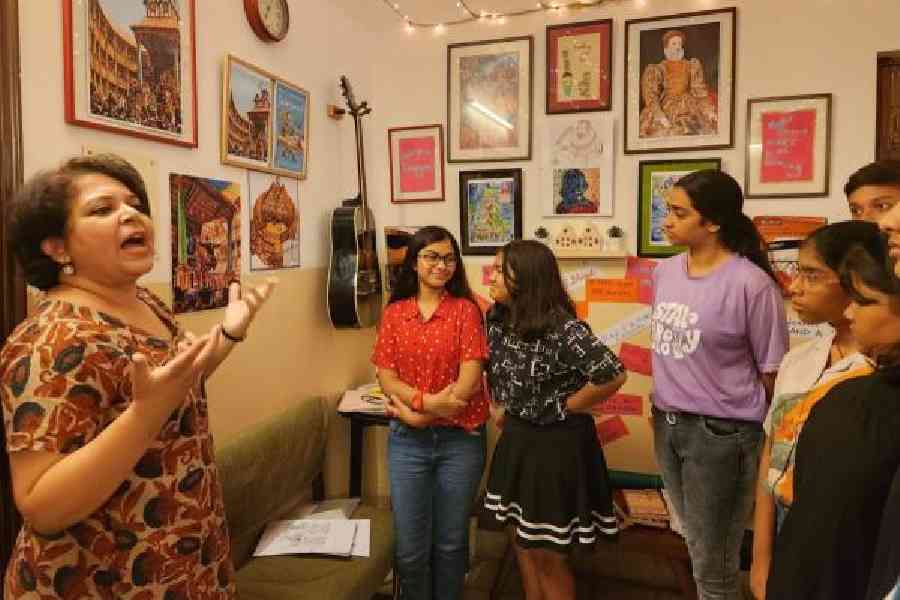What do phrases like “love is blind,” “to break the ice,” “up in arms,” and “a wild goose chase” have in common? Add to that words like swagger, lonely, excitement, and downstairs. The answer is William Shakespeare.
“Shakespeare, 400 years ago, coined some 2,500 new words, of which some 800 are still in daily use,” said author Ushasi Sen Basu. She was at AB Block’s activity centre Busy Bee Academy, conducting Much Ado over Shakespeare, a workshop designed to introduce teenagers to the bard and help them connect with his works in school texts.
“Students are often scared of Shakespeare; he’s considered weighty, whereas his works have the makings of a potboiler,” Ushasi observed. “We’re not duplicating what they learn in school, but giving context and building a world where Shakespeare can fit in.”
The idea for the workshop germinated from Anindita Basu and Trishla Ganguly, who run Busy Bee, with Ushasi Sen Basu giving it form.
The walls of the centre were adorned with words and phrases coined by Shakespeare, alongside pictures of Queen Elizabeth I (a patron of theatre), Elizabethan London, the iconic Globe Theatre where his plays were performed, and the discussions covered the food, fashion and politics of the era.
Life and times
Ushasi explained how politics influenced Shakespere’s plays. “The Spanish back in the day unleashed their Armada – the grandest naval fleet in history – upon England. But the Spaniards were easily and surprisingly defeated. This victory aroused huge nationalistic fervour across the kingdom and inspired Shakespeare to write historical and political plays such as Henry VIII,” she shared.
The teens found great interest in Elizabethan food. The wealthy would consume meats like swans, cranes, and storks, while neither rich nor poor ate many vegetables. Both groups had a major sweet tooth, indulging in cheesecakes and custards. “The rich ate everything glazed in sugar, but without dental hygiene, their teeth would turn black. This actually became a mark of wealth!” Ushasi shared, to the amusement of the teens. “The poor, who couldn’t afford much sugar but wanted to appear rich, blackened their teeth artificially.”
Diseases were rampant. Two-thirds of new-borns died, and life expectancy was around 35 years. “Every time a plague hit the city, the rich would retreat to their country castles, and whenever the death toll crossed 40, public gatherings were cancelled. It was during such times of isolation that Shakespeare often sat down and wrote his plays. This was the time the printing press was becoming affordable, so the poorer people gained greater access to printed works,” Ushasi said.
Not a bed of roses
Shakespeare was born in Stratford-upon-Avon and excelled at grammar school, which placed a huge emphasis on Latin. “But he quit around the age of 15, and no one knows what he did for the next seven years,” Ushasi said. “He reappeared to become a minor actor and then began writing plays.”
The bard was looked down upon by his contemporaries as he wasn’t university-educated. “He wasn’t an instant success either, but he retired a very wealthy man. He lived till his 50s, which was a lot for those times, and bought the second-largest house in Stratford-upon-Avon. He also ‘bought’ the title of gentleman,” she added.
Ushasi felt Shakespeare’s greatness lay in his empathy since even his most villainous characters had some redeeming quality. And given that his plays were meant to be performed, rather than merely read, it was poetic justice when the teens concluded the five-day workshop by dramatising a scene from Julius Caesar.
The students had an enjoyable time. “We’re studying Macbeth in school, so I could relate when discussing his style and technique here. I especially liked the phrase ‘primrose path’ (meaning an easy or pleasant course of action that ultimately leads to trouble) that Shakespeare coined,” said Neil Bose, a Sector V resident and Class XII student who might pursue literature in college. “And I never knew simple words like ‘excitement’ were coined by him, too.”
Is Shakespeare relevant to or
an enjoyable read for today’s youth?
Write to saltlake@abp.in










